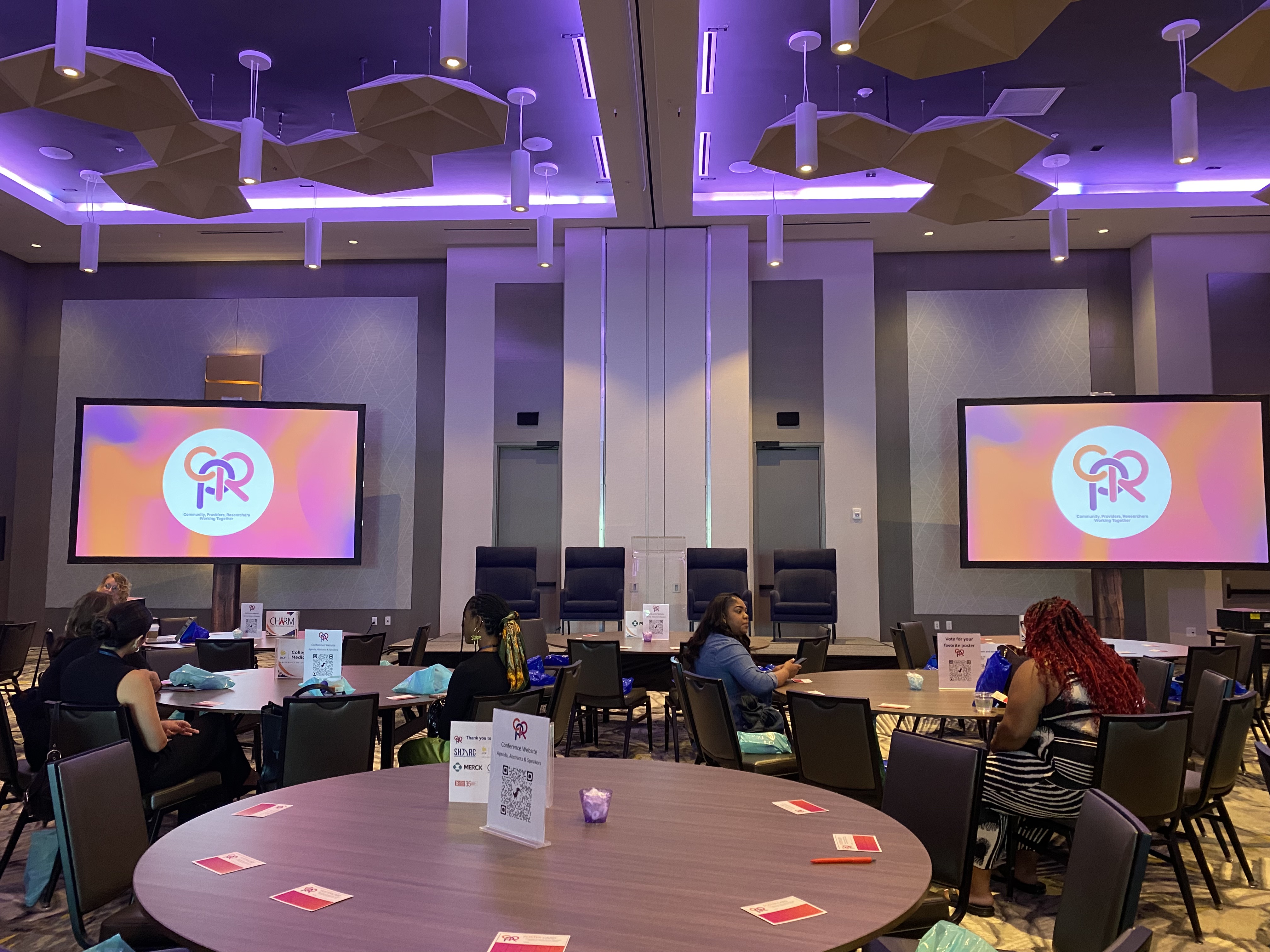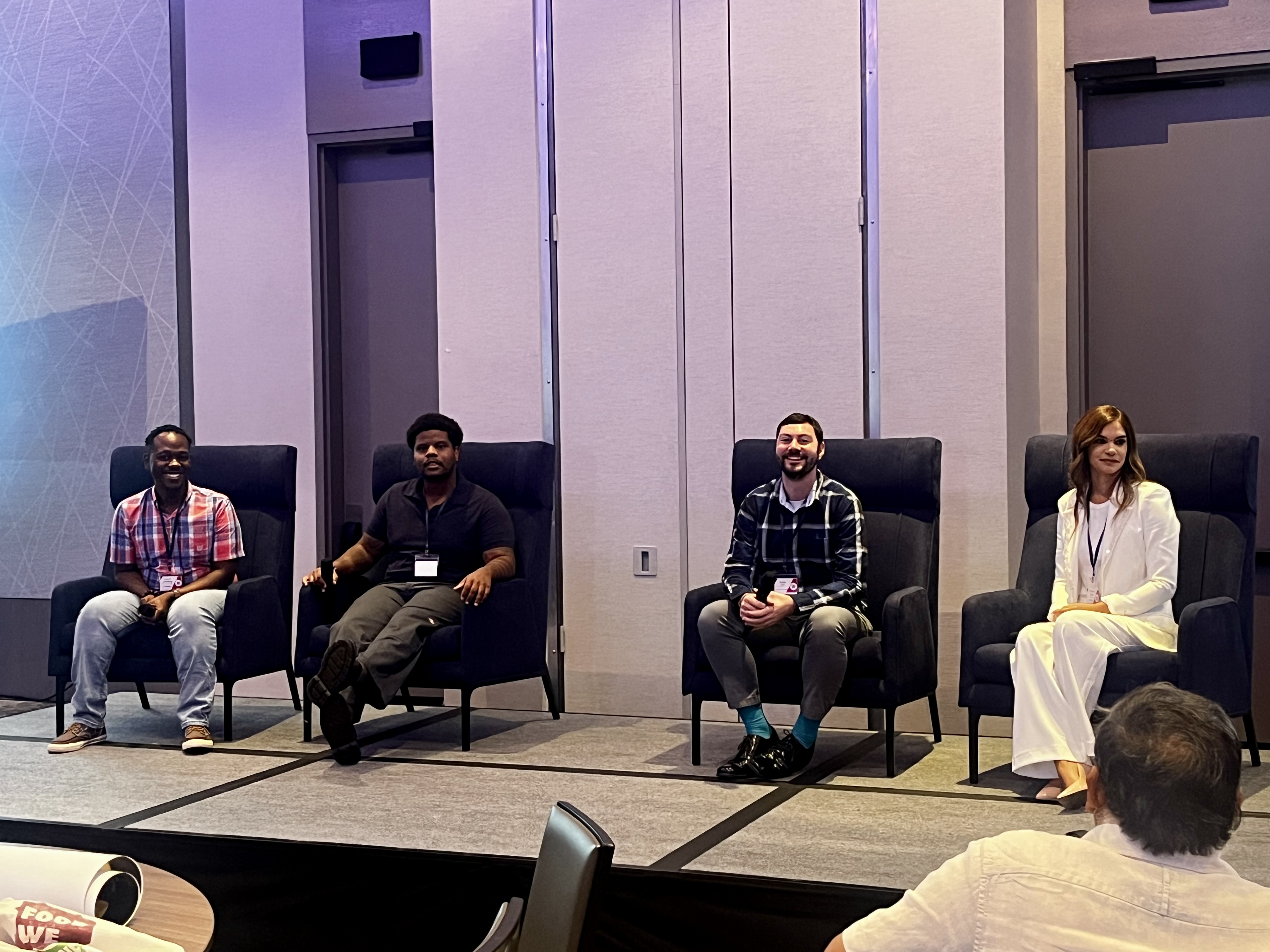SIU-FL presents at 2025 Florida HIV CPR Conference to Advance Community-Engaged Research

SIU-FL presents at 2025 Florida HIV CPR Conference to Advance Community-Engaged Research
The Conference hosted by SHARC (Southern HIV and Alcohol Research Consortium), UCF College of Medicine, Florida Consortium for HIV/AIDS Research, MERCK, CHARM (Center for HIV and Research in Mental Health), ViiV Healthcare, Latino Commission on AIDS, CAN Community Health and NU Health, is a dynamic statewide gathering focused on enhancing collaboration in the fight against HIV.
On April 21 & 22, 2025, members of Scale It Up – Florida gathered in sunny Orlando to attend the 2025 Florida HIV Community, Providers, and Researchers (CPR) Conference. Held annually, this conference brings together an array of perspectives from community members, healthcare providers, and researchers to share insights, explore cutting-edge HIV research and prevention strategies, and build partnerships that bridge gaps in care and knowledge.
This year’s event continued its tradition of fostering meaningful dialogue across sectors, highlighting the importance of including community and provider perspectives in shaping research priorities. Attendees explored pressing issues such as stigma, substance use, and structural hurdles to HIV care, while also learning about innovative programs and research efforts underway across Florida. For Scale It Up – Florida, the conference was a powerful reminder of the value of expanding perspectives and community-driven approaches to improving HIV outcomes.

Conference Kicks Off with Innovation, Insight, and Connection
Orlando, FL — April 21, 2025 — The 2025 Florida HIV CPR Conference launched its first day with energy, collaboration, and a shared vision of ending the HIV epidemic through community-engaged research. The first day was packed with engaging presentations, thoughtful discussions, and opportunities for meaningful networking.
A Global Lens for Local Impact
Kicking off the sessions, Dr. Renee Heffron presented a powerful keynote titled “Implementation Science to Advance HIV Prevention in Uganda: Lessons Learned and a Lens for Applying Them in the Southeastern US.” She highlighted strategies used successfully in Uganda and emphasized how similar frameworks could address gaps in the Southeastern U.S., particularly in hard to reach communities. She spoke about harm reduction programs in which she worked in close collaboration with “peers” who served as the ambassadors for the program. Noteworthy observations were that level of education was a factor, a calendar schedule doesn’t always work and that being IN the field resulted in better outcomes. Her advice was to listen more than you speak, build relationships, realize that we are all more similar than we are different. Her final remarks were from an African proverb, “If you want to go fast go alone; if you want to go far, go together.” This quote set the tone for the following two day event, emphasizing the difference between individual vs. collective action.
Highlighting Emerging Research
Following the keynote presentation were Select Abstract Presentations, where emerging researchers and students shared their work in brief, compelling sessions. This spotlight on fresh perspectives continued during the lively poster presentation session, offering attendees the chance to explore a wide array of HIV-related research while connecting directly with presenters.
Below are the selected abstracts (click the link to read each one)
Rates of HIV in Florida Before versus After Syringe Services Program Implementation: An Exploratory Difference-in-Difference Analysis by Bedis Elkamel
Differences in PrEP Use and Engagement Across Gender Subgroups within a National Sample of Transgender and Nonbinary Young Adults by Lindsay Taliaferro
From Stakeholders to Co-Researchers: Advancing HIV Research Through the Subject Matter Research Consultant Model by Rahim Miller
Members of the Scale It Up - Florida (SIU) team presented two different research posters, you can read the abstracts by clicking on the links below.
Title: Navigating Recruitment Successes and Retention Challenges: Insights from the SHARE ProgramContributing Author(s): K. Hicks, MPH, S.S. Green, MSW, S.M. Pickett, PhD, S. Solis, K. MacDonell, PhD, H. Gao, PhD, Y. Dai, PhD Presenter: Kayla Hicks | Florida State University- College of Medicine
Title: Mystery shopping at free HIV testing clinics in Florida: Notes from the field on anonymous testing policies Contributing Author(s): Rebecca Giguere, MPH; Andrea Cheshure, MS; Sara K Shaw Green, MSW; Willey Lin, MA; Jonathan Morgan, BA; Milo St. Ives, BA; Isaac Richardson, MSW, Seul Ki Choi, Ph.D., Iván C. Balán, Ph.D., José A. Bauermeister, Ph.D., MPH; Sylvie Naar, Ph.D. Presenter: Jonathan Morgan and Isaac Richardson | Florida State University


Critical State and Federal Policy Conversations
After lunch, Stephanie Hengst led a crucial session on State and Federal Policies and Their Impact on HIV Prevention and Treatment. With clarity and urgency, she unpacked how recent legislative trends are influencing access to care, PrEP, and treatment continuity—especially for populations most affected by the epidemic.
Tackling Substance Use and PrEP Access
A highlight of the afternoon was the Panel Discussion on Substance Abuse and PrEP, moderated by Sherkila Shaw and Dr. Deborah Jones Weiss. Panelists Dedre Delores Brown, Arnetta E. Phillips, Lamar (LJ), and others engaged in a raw, real conversation about the biases that impact individuals who use substances and their access to PrEP. The session underscored the need for compassionate, non-stigmatizing care strategies.
Advice from the panelists to the research community as well as providers during the Q&A portion was to approach research participants with compassion and empathy—treat them as people, not just data. Prioritize building trust by engaging in genuine conversation, listening to their stories, and being patient and nonjudgmental. Emphasize the human side of research by working collaboratively, ensuring everyone feels heard and valued throughout the process.
Preventing HIV Transmission: Local to Global Successes
Dr. Rana Chakraborty followed with an informative presentation on the Prevention of Vertical Transmission of HIV, sharing successes and ongoing challenges both in the U.S. and globally. His insights reinforced the importance of sustained funding and education for maternal health and pediatric HIV care.
Person-First Approaches in HIV Research
The afternoon wrapped up with “A Person-First Analysis of an HIV Network” by Colby Cohen, Kyle Nowotny, and Karalee Poschman (FDOH). Their presentation emphasized the importance of seeing individuals as more than just data points and encouraged attendees to rethink how networks and support systems are studied and implemented. They encouraged information to be exchanged between counties and gave examples of HIV-transmission networks seen in counties such as Volusia and Collier.
Wrapping Up with Connection
The day concluded with a warm and welcoming Dinner and Networking Reception, where old friends reconnected and new collaborations began to form. The energy in the lobby was electric—proof of a community that’s not just passionate but persistent in pushing forward together.
Day One of the 2025 Florida HIV CPR Conference was a testament to the power of shared knowledge, lived experience, and community-based solutions. As the conference continues, attendees can look forward to more rich dialogue, intersectional perspectives, and innovative strategies that promise to shape the future of HIV prevention and care.
Collaboration, Innovation, and Connection Take Center Stage: Day 2 of the 2025 Florida HIV CPR Conference
A Morning of Mentorship
The second and final day of the Conference began with a strong sense of purpose and community. As attendees gathered over breakfast in the venue’s lively lobby, the much-anticipated Coffee with a Mentor event set the tone for the morning. This informal session offered participants a special chance to connect directly with leading voices in health, research, and education. Whether students, early-career professionals or seasoned researchers, all left the hour-long exchange with renewed inspiration and personal insights to guide their work in the HIV field.
Spotlighting Innovation: Poster Presentations
Immediately following, the lobby transformed into a vibrant hub of innovation for the second day of Poster Presentations. A wide range of topics was on display—highlighting new research, community-based interventions, and creative strategies to tackle health disparities. The session provided a space for dialogue and collaboration, allowing attendees to engage directly with poster presenters and learn more about the different efforts taking place across Florida.
Data and Disparities: Dr. Sullivan’s PrEP Presentation
By mid-morning, the conference shifted to the Main Hall for a featured presentation by Dr. Patrick Sean Sullivan:“Update on Uptake: PrEP Usage in the United States.” Dr. Sullivan offered a data-driven exploration of national trends in pre-exposure prophylaxis (PrEP) use, emphasizing both progress and persistent difficulties in access. He introduced new metrics for assessing disparities in HIV prevention and underscored a powerful takeaway—on average, 30 people must be on PrEP to prevent just one new HIV infection. The session left attendees with a deeper understanding of the epidemic and a brief introduction to AIDSVu, a powerful tool needed to visualize and address prevention gaps.
Key insights from Dr. Sullivans talk were that since 2012, the U.S. has seen a 1700% increase in PrEP usage, signaling major strides in HIV prevention access. However, data shows that social determinants of health (SDOH)—such as income, geography, and healthcare access among others SDOH—continue to create difficulties in who actually receives PrEP. An emphasis on the PrEP-to-need ratio—a measure of how well PrEP access aligns with HIV risk—remains low in communities most impacted by the epidemic. A core takeaway: “Health perspectives are inseparable from common sense.” Not everyone is at the same risk, and prevention efforts must reflect that.
Real Talk on PrEP: Expert Panel Sparks Insight and Action
The momentum continued with a Panel Presentation on PrEP—a highlight of the day that brought together a dynamic lineup of panelists, including members of Scale It Up - Florida (SIU), Isaac Richardson and Michael Bratt alongside Dr. Dianylisse Rivera and Raynal K. Bateman. The panel was moderated by SIU program director, Jonathan Morgan, as well as Dr. Deborah Jones Weiss. This powerhouse panel tackled real-world challenges and successes in PrEP implementation, bridging the gap between data and community needs. Lively discussion, insightful questions, and a shared commitment to better health outcomes made this session a memorable moment.

Celebrating Progress: Awards and Closing Reflections
After a brief midday break, the conference concluded with Awards and Closing Remarks led by Dr. Robert Cook, MD, MPH. Celebrating the accomplishments of presenters, mentors, and attendees alike, Dr. Cook underscored the importance of continued collaboration, innovation, and communication in Florida’s HIV response to ending the HIV epidemic.
A Strong Finish to a Transformative Gathering
As participants departed, the spirit of connection and commitment remained. Day 2 of the 2025 Florida HIV CPR Conference not only reflected the thriving passion of its community but reaffirmed that the fight to end the HIV epidemic is both a shared journey and a deeply personal mission.
To read more about Community, Providers and Researchers (CPR) Conference, and to view all poster Abstracts and presentation slides, click here.
